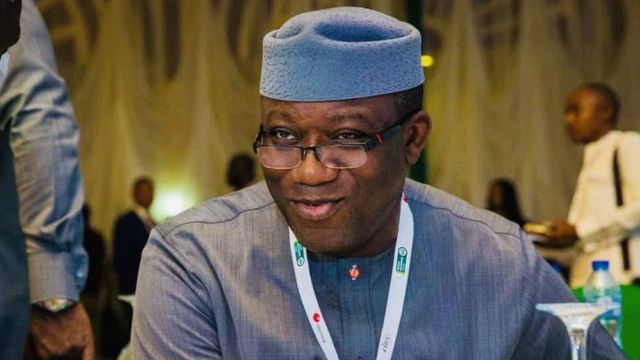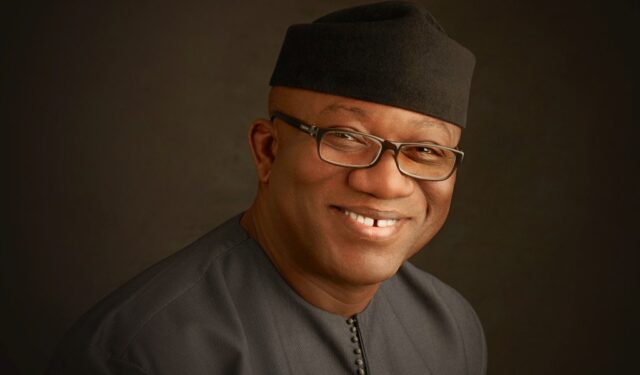
John Olukayode Fayemi, (born 9 February 1965) is a Nigerian politician who is currently serving as the Governor of Ekiti State, in office since 16 October 2018. He previously served in office between 2010 and 2014 before losing re-election to Ayodele Fayose. He was also the Minister of Solid Minerals Development in President Muhammadu Buhari‘s cabinet from 11 November 2015 to 30 May 2018, when he resigned to contest for a second time as Governor of Ekiti State.
 Early life
Early life
John Olukayode Folorunso Fayemi was born in Ibadan on 9 February 1965 to an Ekiti parentage from Isan-Ekiti in Oye Local Government of Ekiti State.
Education
 Fayemi had his primary education at ICC Primary School, Agodi, Ibadan, Oyo State between 1970-1975 and attended Christ’s School Ado Ekiti from 1975 to 1980. He later went on to receive degrees in History, Politics and International Relations from the University of Lagos and University of Ife (now Obafemi Awolowo University). From 1989 to 1992, he earned a Doctorate in War Studies from King’s College London, specializing in civil-military relations.
Fayemi had his primary education at ICC Primary School, Agodi, Ibadan, Oyo State between 1970-1975 and attended Christ’s School Ado Ekiti from 1975 to 1980. He later went on to receive degrees in History, Politics and International Relations from the University of Lagos and University of Ife (now Obafemi Awolowo University). From 1989 to 1992, he earned a Doctorate in War Studies from King’s College London, specializing in civil-military relations.
Career
After his first degree in 1984, he proceeded on the mandatory one year National Youth service Corps from 1985 to 1986, during which he was a lecturer at the Nigeria-Police Training College in Sokoto. After his service year, he served as a Research Officer at Development & Management Consultants in Ikeja between 1987-1989. When he moved to the UK to pursue his doctoral studies between 1991 to 1993 he worked as a Research Officer at the African Research and Information Bureau in London. In 1992, he was a Tutorial Fellow at the War Studies Department at Kings College, London during his doctoral studies. Later between 1993 to 1995, he was the Strategy Development Adviser of Deptford City Challenge in London and later served as the Secretary General of the Media Empowerment for Africa (The Radio Foundation) in London between 1995-1997. He was also a journalist with The Guardian and City Tempo; and the Editor of Nigeria-Now, a defunct political monthly magazine. In 1997, Fayemi returned to Nigeria where he established the Centre for Democracy and Development Centre for Democracy & Development, a research and training institution dedicated to the study and promotion of democratic development, peace-building and human security in Africa, where he served as Director from 1997 to 2006.☃☃
Kayode Fayemi has taught in Africa, Europe, the Americas and Asia. He has also served as an adviser on transitional justice, regional integration, constitutionalism, security sector reform and civil-military relations issues to various governments, inter-governmental institutions and development agencies. He was the main technical adviser to Nigeria’s The Human Rights Violations Investigation Commission (Oputa Panel), which investigated past abuses and served on the Presidential Implementation Committees on Security Sector Reform, NEPAD and the Millennium Development Goals. He was technical expert to the Economic Community of West African States (ECOWAS) on small arms and light weapons and United Nations Economic Commission for Africa on governance issues. At other times he has served as a consultant to the OECD on Security Sector Reform and chaired the Commonwealth Human Rights Initiative’s Committee of Experts on developing guiding principles and mechanisms of constitution making in Commonwealth Africa.
 Elections
Elections
In 2006, Fayemi made his entry into partisan politics ahead of the 2007 election during which he contested for Governor of Ekiti State under the defunct Action Congress. After three and a half years fighting through the legal system, on 15 October 2010 the appeal court sitting in Kwara state declared Fayemi the duly elected Governor of Ekiti State, and marked the end of Olusegun Oni‘s administration as the then Governor of the state Daily Trust, a national daily, captured the electoral journey in its editorial, published on Friday, 22 October 2010 under the title, Closure to Ekiti 2007 Governorship Saga.
Governor of Ekiti State
In April 2014, Fayemi was endorsed as the governorship candidates of the All Progressives Congress in the state’s gubernatorial elections slated for 21 June 2014. The emergence of Fayemi was preceded by congress held before the governor who had no contestant was endorsed as the flag bearers of their state in the governorship elections. Kayode Fayemi was defeated at the polls on 21 June 2014 by previous governor Ayodele Fayose.
Fayemi recontested for second term as Ekiti state governor under the platform of the All Progressive Congress in the 14 July 2018 governorship election after resigning as the Minister of Solid Minerals Development. He was officially declared the winner of the 2018 Ekiti State gubernatorial election by the Independent National Electoral Commission on 15 July 2018. He won by 19,345 votes against the Peoples Democratic Party’s Kolapo Olusola Eleka who was second.
In October 2018, Fayemi was sworn in as Ekiti State governor for the second time. Fayemi was elected Chairman of the Nigeria Governors’ Forum. This announcement was made by the immediate past chairman, Abdulaziz Yari on Wednesday evening. He said Fayemi was unanimously elected by the governors to lead the forum till 2021.
Corruption
The Independent Corrupt Practices Commission (ICPC) in 2016 investigated Fayemi’s tenure as Governor of Ekiti State from 2010 to 2014, for an alleged misappropriation of over N25 billion infrastructure bond by his government. In July 2020, he was accused of “financial impropriety” relating to the Ajaokuta Steel Mill during his tenure as Minister of Solid Minerals from 2015 to 2018. All charges were later dropped and he was found innocent. These corruption charges were dropped based on his affiliation and relationship with the APC government.However , severally petitions have been filed against him at EFCC but there has been no responses nor investigation done about the various corruption allegations ranging from misappropriation of public funds and gross high handedness during his first tenure as Governor of Ekiti state.
EndSars protest
in October 2020 during the nationwide #EndSars protest he joined the protesters at the pretest grounds to express his support for their demand but advised on the need for them to have an exit strategy and on the need to create a window of dialogue with the Federal Government on their demands before the protest was hijack. He narrated his experience as one of the notable faces of the anti-military and protesters that facilitated the current democratic order. He said his group knew when to pause to negotiate with the government and that made them successful. He said this at a virtual symposium held by the Harvard Kenny Alumni Association of Nigeria with the theme :The Africa Policy Dialogue Series: Harnessing Africa’s Demographic Dividend for Peace, Security and Productivity through Investments in Youth. He admitted that the youths, who were actively participating in the #Endsars protest at the time, had a right to demand for good governance and an end to police brutality, saying the government owes that to them.
Source: Wikipedia







